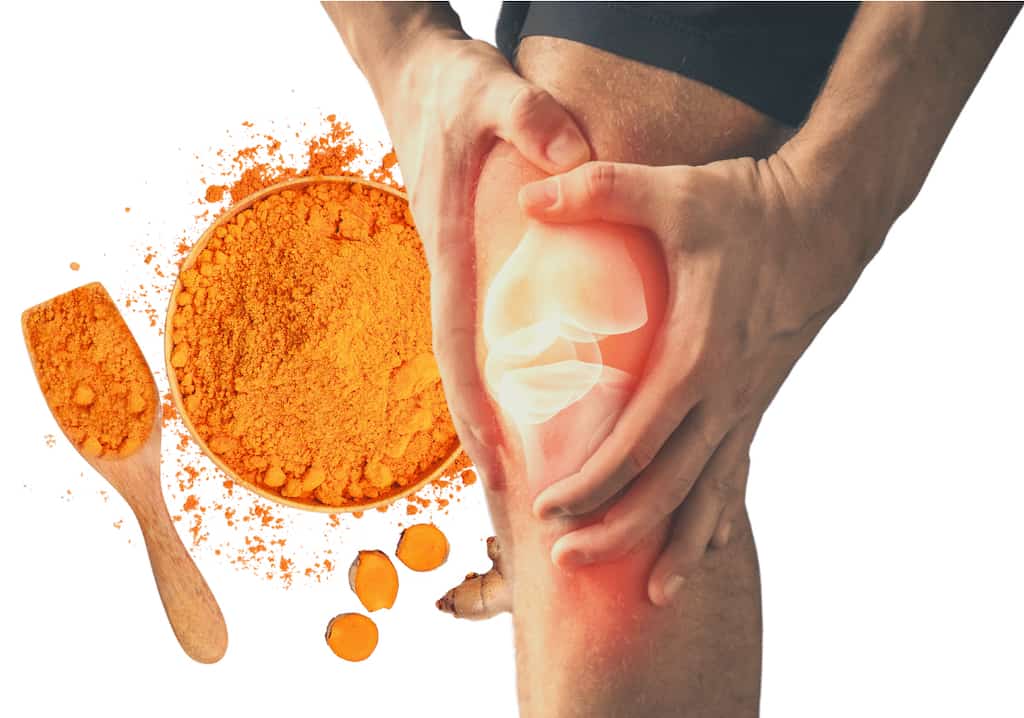Reduces The Detoxification Burden On The Kidneys
Kidney diseases or kidney failure may result as a result of liver failure. We are all aware that both the kidneys and the liver play a role in detoxification.
Detoxification entails the removal of toxic materials outside the human body.
The Turmeric Curcumin and kidney diseases relationship come in such a way that Curcumin in turmeric stimulates the production of detoxifying enzymes in the liver.
These enzymes facilitate maximum removal of waste products from the liver and out the body. This, in turn, relieves the kidneys the pressure of having to remove all the wastes by themselves.
Protection Of The Kidneys
Through its anti-inflammatory and antioxidant actions, curcumin can protect the kidneys from damage. People with CKD are at an increased risk of acute kidney injury which might occur with the use of certain drugs. AKI can cause further damage to the kidneys and increase the risk of progression of CKD.
Animal studies have shown that curcumin can protect against AKI. It has been shown to protect against drugs well known to cause kidney damage including gentamicin, adriamycin, cisplatin, cyclosporin and chloroquine and also protects against kidney damage from heavy metal exposure.
Who Should Not Use Turmeric
Do not use turmeric if you have gallstones or a bile duct obstruction. Bleeding problems: Taking turmeric might slow blood clotting. This might increase the risk of bruising and bleeding in people with bleeding disorders. Diabetes: Curcumin, a chemical in turmeric, might decrease blood sugar in people with diabetes.
Read Also: Does Red Wine Cause Kidney Stones
Bottom Line: Turmeric Is Mostly Safe But Be Sure To Check With Your Doctor
As a spice, turmeric can add tons of flavor to your cooking along with anti-inflammatory effects and antioxidants to protect you against free radicals. But you may be able to reap greater benefits by taking turmeric in supplement form.
Though turmeric is generally recognized as safe, its always smart to talk with your doctor before adding a supplement to your diet, especially if youre already taking other medications. Or at the very least, make sure to mention youre taking it the next time you go in for a checkup. People dont necessarily tell their doctor theyre taking a supplement, but its always important to disclose that to make sure there arent any contraindications, White says. Your doctor may even be able to help you figure out the ideal dosage for your health goals.
By subscribing you agree to the Terms of Use and Privacy Policy.
Are Spices Bad For Kidneys

4.4/5spiceskidney
Diets high in salt are high in sodium, which can increase blood pressure and, in turn, harm your kidneys. Flavor your foods with herbs and spices instead of salt. Over time, you may find it easier to avoid using added salt on your food.
One may also ask, is Paprika bad for kidneys? In addition, sodium is linked to high blood pressure that can cause even more damage to ailing kidneys. Herbs and spices for flavoring vegetables.
| Allspice | |
|---|---|
| Pepper: black, red and white | Rosemary |
| Tarragon |
Additionally, which herbs are bad for kidneys?
Johns Wort, echinacea, ginkgo, garlic, ginseng, ginger, and blue cohosh. If you have a kidney transplant you are especially at risk, as any interaction between herbal supplements and medicines could put you at risk for losing your kidney.
What spices are low in potassium?
Spices and Herbs
- You’ve cut back on protein. You are limiting potassium and phosphorus.
- Cinnamon. Cinnamon has one of the highest antioxidant levels of any spice.
- Ginger. Ginger has as many antioxidants as cup of spinach.
- Oregano.
From your morning glass of water to that extra cup of herbal tea, here are four ways to cleanse your kidneys and keep them functioning strong.
Don’t Miss: Can Mio Cause Kidney Stones
What Fruit Is Good For Kidneys
7 Kidney-Friendly Superfoods
- Apples: Apples are a good source of pectin, a soluble fiber that can lower cholesterol and glucose levels.
- Blueberries: Ranked #1 among fresh or frozen fruits and vegetables in antioxidant power, blueberries are a low-calorie source of fiber and Vitamin C.
- Great Way to Start Your Day Bagel.
- High-Protein Apple Oatmeal in a Mug.
- Microwave Coffee Cup Egg Scramble.
- No-Fuss Microwave Egg White French Toast.
Are There Any Side Effects
Turmeric is generally safe in healthy individuals when used in small doses. However, it may cause adverse reactions in some people. The National Center for Complementary and Integrative Health warns against using turmeric in high doses or for long periods, as it may trigger digestive problems. Constipation, diarrhea, nausea, vomiting, acid reflux and abdominal pain are common side effects.
This spice may also interact with certain medications, such as anticancer and immunosuppressant drugs.
A case report published in Transplantation Proceedings in the January-February 2017 issue outlines the interaction between turmeric and Tacrolimus, an immunosuppressant drug. A 56-year-old man with a history of liver transplantation ended up in the ER after taking this medicine along with high doses of turmeric. His symptoms included high creatinine levels and edema .
Another case report, which was published in Nefrologia in the November-December 2018 issue, indicates that turmeric may not be safe for dialysis patients when used in large amounts. A 63-year-old woman on dialysis developed hematomas and experienced spontaneous bleeding episodes after taking 3 to 5 grams of turmeric infusions for several days. As the researchers note, this spice may have anticoagulant effects and increase the risk of bleeding.
Warning
Like most supplements and herbal remedies, this spice carries potential risks. Use it with caution, especially if you have a pre-existing condition.
Also Check: Renal Diet Orange Juice
What Foods Are Hard On The Kidneys
Here are 17 foods that you should likely avoid on a renal diet.Dark-colored soda. In addition to the calories and sugar that sodas provide, they harbor additives that contain phosphorus, especially dark-colored sodas. Avocados. Canned foods. Whole wheat bread. Brown rice. Bananas. Dairy. Oranges and orange juice.More items
Be Careful With The Market
A few brands are exploiting the trendy expression by not by and large selling what they guarantee. For instance, a soli d turmeric bar, which is stack with 20 grams of sugar and additives, and has a scramble of turmeric, is clearly not beneficial for you.
It has quite a lot more irritation causing substance , which makes the mitigating present in it irrelevant. In this way, in camouflage of a sound turmeric bar, they are selling the most unfortunate bar, loaded with sugar.
This customary Chinese therapeutic spice is known for its regular cell reinforcement an d mitigating properties. Its foun d in turmeric and gives the flavor its yellow tone. Studies show curcumin 95 may assist with specific conditions, including joint pain, fiery entrail illness, and greasy liver infection. You can discover it in the flavor walkway. Its additionally in containers, creams, drinks, and splashes.
Read Also: Are Grapes Good For Kidney Stones
Thedrugs And Supplements That Should Cause Concern
The following drugs andsupplements can affect kidney function:
1. NSAIDS
NSAIDs are very effectivemedications for multiple medical problems. But taking NSAIDS can affectthe kidneys, and can cause damage, especially if youre also takingdiuretics or ACE inhibitors.
NSAIDS include over-the-counterpainkillers like aspirin , ibuprofen , and naproxen .
They also includeprescription drugs like:
- Naproxen sodium .
- Naproxen/esomeprazole .
- Diclofenac .
Using these medications withcaffeine can further harm your kidneys. When taking these medications, be sureto check regularly with your doctor if you have impaired kidney function.
2. Antibiotics
Certain antibiotics areremoved from the body through the kidneys, so taking them can put extra strainon your kidneys. Penicillin, cephalosporins and sulfonamides in particular canbe harmful to your kidneys.
Long-term antibiotic use caninjure your kidneys, even if youre otherwise healthy. And for people whosekidneys arent functioning at 100% to begin with, antibiotics can build up inthe body and cause damage.
Despite this, its importantto keep in mind that antibiotics can be safely used if needed as long as thedose is adjusted for your bodys level of kidney function.
3. Dietary supplements
Certain herbs or nutritionalsupplements are associated with kidney injury, even among healthy people. Withsuch a wide variety of supplements available, the best way to know if asupplement is safe is to ask your doctor to review all the ingredients.
Is It Safe To Use Herbal Supplements If I Have Kidney Disease
You may think about using herbal supplements to help with any health concerns you may have, but as a patient with kidney disease, you should use caution with herbal supplements.
Use of herbal supplements is often unsafe if you have kidney disease since some herbal products can cause harm to your kidneys and even make your kidney disease worse. Also, your kidneys cannot clear waste products that can build up in your body.
The herbal supplement market is a multi-million dollar business. You may hear from a friend or family member about an herbal supplement that they think has improved their health or well-being and they suggest it to you. While this advice may be fine for them, it can be dangerous for you with kidney disease.
Also Check: Is Cranberry Juice Good For Your Liver
Turmeric Promotes Heart Health
Cardiovascular issues can battle alongside kidney problems and wreak total havoc in the body. However, with turmerics anti-inflammatory properties, it can also help the heart along the way.
Turmeric reduces inflammation in the heart, as well as balances blood pressure. It helps the heart into working optimally, reducing the strain to the kidneys.
The liver and kidneys work in tandem, meaning that the failure of one will burden the other. Most people dealing with liver failure will have struggling kidneys in the long run.
Turmeric ensures that both organs are working at their best by improving
Turmeric May Lower Blood Sugar Too Much

On the one hand, some research suggests that turmeric may help treat and prevent diabetes, according to a review in Evidence-Based Complementary and Alternative Medicine. That said, turmeric may magnify the effects of diabetes medications that lower blood sugar, increasing your risk of low blood sugar . More research in humans is needed. Dont take turmeric supplements for diabetes without first checking with your doctor.
Recommended Reading: Can You Have 4 Kidneys
Nuclear Factor Erythroid 2
Detection of Nrf2 was performed on 4-m tissue slices as described recently by Brand et al. , with the following primary and secondary antibodies: anti-Nrf2 , donkey anti-rabbit IgG-B . For an increased signal amplification of Nrf2, the Tyramide Signal Amplification Biotin System was used according to the manufacturer’s instructions. Antibody binding was detected using a diaminobenzidine kit according to the instructions with the exception that the DAB solution was additionally diluted 1:2 v/v. Sections were counterstained with haematoxylin. Pictures were taken with an Olympus BX 43 microscope using the 20 times objective lens. The area of the Nrf2 staining was assessed by ImageJ and related to the tissue area also evaluated with ImageJ 1.51a4 .
Does Too Much Turmeric Have Side Effects
Turmeric is a popular yellow spice originating from southern Asia. Its an essential ingredient in many Indian dishes.
Its also consumed for its health benefits. Supplements of turmeric, or curcumin its main active ingredient are becoming increasingly common.
However, some people are concerned about the possible side effects of high-dose turmeric and curcumin supplements. This review looks into the evidence.
Also Check: Does Red Wine Cause Kidney Stones
Is Turmeric Bad For The Kidneys
You may know turmeric as the zest utilized in kitchens that has a peculiar an unusual taste and unmistakable yellow color. Be that as it may, turmeric offers more helpful attributes than you might suspect. Turmeric contains compounds called curcuminoids which has incredible anti-inflammatory properties and accepted to be an exceptionally very strong cancer-preventing agent.
The therapeutic properties help a person to chip away infection, enhance digestion, and prevent different kinds of cancers. Since it is a zest, turmeric has a touch of heat and bitter flavor. Indian ladies use turmeric in their kitchen to add yellow shade or color to the curry.
Curcumin or what we also called turmeric is a well-known nutritive helpful herb that has a distinctive taste like a spice. It is the best therapeutic herbal supplement accessible to us in the bounty. Notwithstanding, the amount of curcumin isnt that high, and noted to be just 3% of the weight.
Turmeric is additionally useful to turn away conditions like chronic kidney disease if taken in an adequate way. Including a pinch of turmeric in your cooking regimen will revive the harmed kidney cells yet an excess inclusion of it in your suppers can trigger renal failure also so be careful of the quantity you are using. Thus, it can be concluded that turmeric is not bad for the kidneys if consumed in a limited amount.
Does Turmeric Help Sexually
It turns out that an ointment created from turmeric can actually help men deal with erectile dysfunction. Scientists even suggested that a chemical called curcumin found in the spice may be better than several drugs. The ointment can seep through the skin and boosts blood flow to genitals when rubbed on the stomach.
Read Also: Pomegranate Juice Good For Kidney Stones
What Are The Adverse Consequences Of Turmeric
There are other likely dangers to taking a lot of curcumin, including:
- Mild incidental effects incorporate resentful stomach, indigestion, loose bowels, dazedness and cerebral pains.
- Since turmeric goes about as a blood more slender, it ought to be stay away from in the event that you have a draining problem.
- Turmeric can collaborate contrarily with meds including blood thinners, antidepressants, anti-toxins, antihistamines, cardiovascular meds and chemotherapy medicines. It can likewise meddle with diabetes drugs and result in perilously low glucose levels.
Kidney Impairment Can Be Costly
Although renal impairment is often reversible if the offending drug is discontinued, the condition can be costly and may require multiple interventions, including hospitalization, Dr. Naughton explained. To help you avoid getting to that point, we learned about medications that commonly cause kidney damage from Rebekah Krupski, PharmD, RPh, pharmacy resident at the Cleveland Clinic and clinical instructor of pharmacy practice at Northeast Ohio Medical University.
You May Like: Does Red Wine Cause Kidney Stones
Can Turmeric Cause Kidney Problems
NO, dietary turmeric does not cause kidney problems. Consumption of turmeric in the diet is good for kidney health.
However, due to its oxalate content and the presence of certain minerals, high doses of turmeric spice should be avoided by those who are instructed to minimize dietary oxalate and potassium, etc.
Let us know more about the effect of turmeric on kidneys.
Curcumin And Chronic Kidney Disease

As it turns out, there might be a connection between curcumin and chronic kidney disease. According to a December 2014 research paper featured in Molecules, the leakage of cytokines and other pro-inflammatory compounds in the gut increases intestinal permeability. This may lead to diabetes, chronic kidney disease and plaque buildup on the artery walls. Curcumin may help reduce inflammation in the gut and hence protect against these disorders or improve their symptoms.
Furthermore, curcumin may delay the progression of chronic kidney disease, but more research is needed to confirm these findings. Most studies conducted so far were small but had promising results.
For example, a small clinical trial involving 24 patients with lupus nephritis, or kidney inflammation caused by lupus, suggests that curcumin may reduce systolic blood pressure, excess proteins in the urine and hematuria over just three months of treatment. The results were published in the Journal of Renal Nutrition in January 2012.
Read more:Do These 11 So-Called Superfoods Live Up to the Hype?
Recommended Reading: Kidney Pain Medical Term
Is Turmeric Good Or Bad For Kidney Disease
Is turmeric good for kidney disease? is another common question I get asked by many of my renal patients when they start their specific diet. I will answer this question in a nuanced manner so that the readers get more insight into turmeric and its effect on people suffering from kidney diseases.Tumeric is a very popular spice found in virtually every household of India. Turmeric is largely grown in the tropics and is recognized by different names in different regions, for example in the northern part of India, turmeric is commonly called Haldi and in the southern part of India, it is also known as Manjal.
Turmeric does a lot more than simply giving the yellow color or adding a flavor to the food. Turmeric has various nutritional properties like fighting against inflammation, helping with digestive issues and the boosting immune system.
Coming back to the question, Is turmeric good for kidney disease?. When it comes to kidney diseases, inflammation is one of the biggest reasons for the progression of the disease which could lead to the complete failure of the kidneys.
Is Turmeric Bad For Your Kidneys
Kidneys are a bean shaped organ, present in a pair, one on each side of the spine. They are located below the rib cage at the back. They remove any waste materials from the blood maintain the fluid balance in our body and a keep the balance of minerals and salts, and all the electrolytes.
This procedure, however, is not as simple as it looks from the description above. It is a complex procedure, and for this procedure to go on smoothly, the kidneys need to be in their prime health. There are many reasons for a kidney to lose its normal functioning. Some factors are genetic or hereditary, while others are acquired. While one cannot prevent genetic or hereditary factors from interfering with the kidneys, one can surely take some measures to prevent the acquired factors from disturbing the otherwise normal kidney functions.
Read Also: Can Carbonated Water Cause Kidney Stones